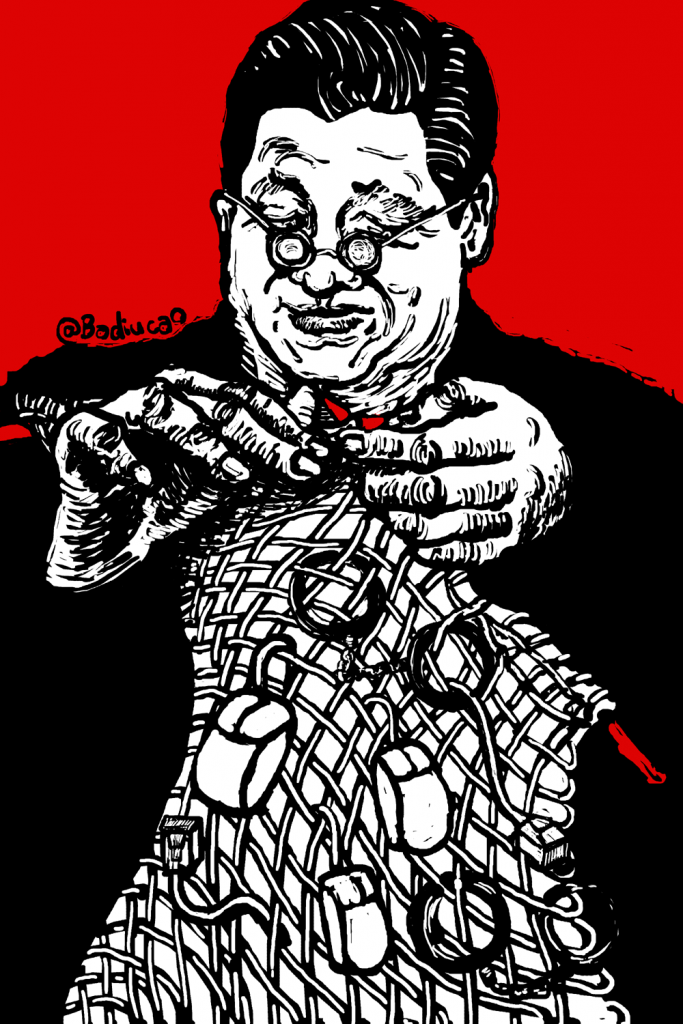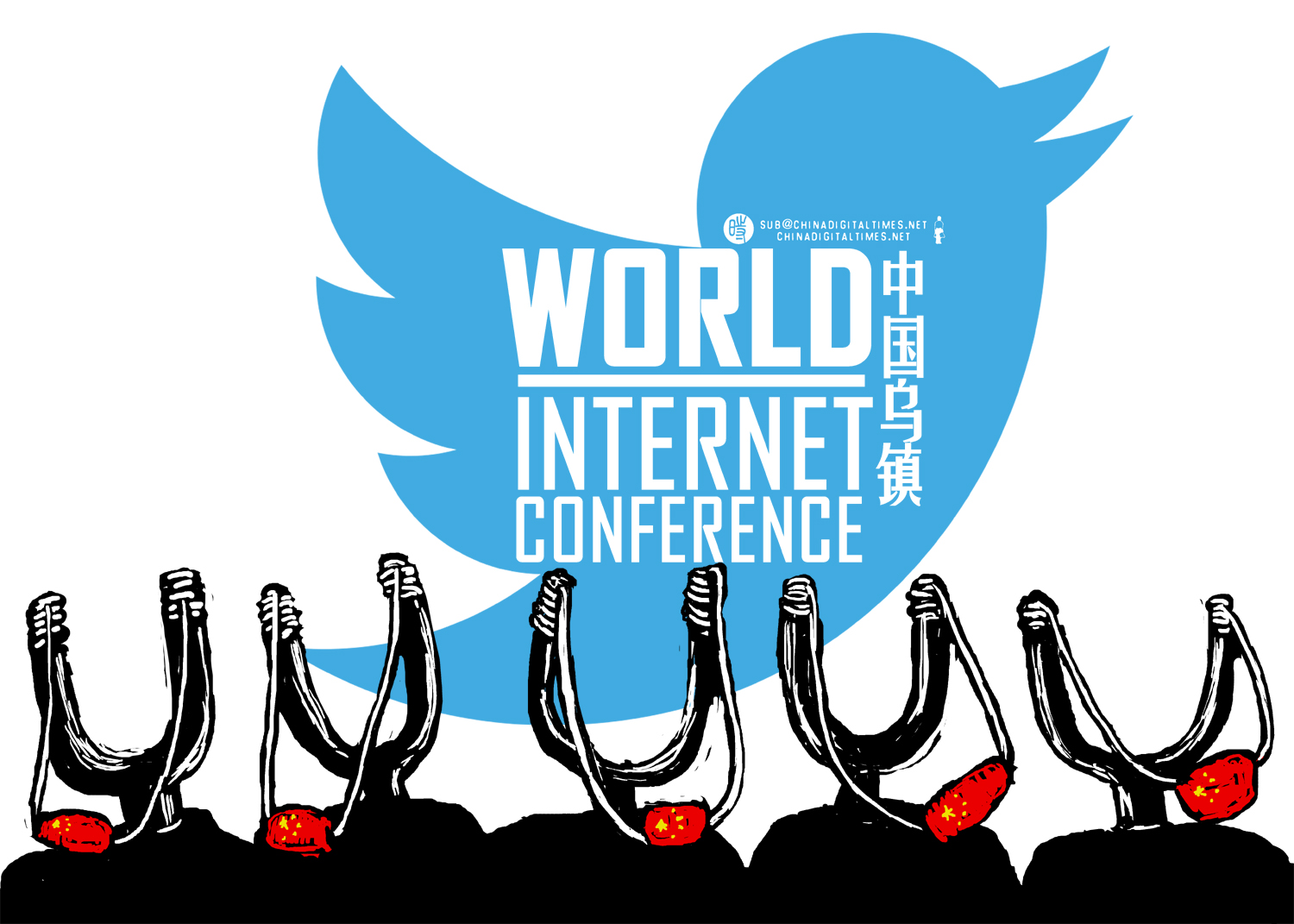
“Dada’s Internet Conference” by Badiucao.
China’s second World Internet Conference is underway in Wuzhen, Zhejiang. At last year’s event, Beijing’s concept of “Internet sovereignty” was being promoted to attendees—who enjoyed free access to the uncensored Internet while on location—prompting netizens to spin the Chinese name of the event (Shìjìe Hùliánwǎng Dàhuì 世界互联网大会) into “World Saving Face Internet Conference” (Shìjìe Hùliǎnwǎng Dàhuì 世界护脸网大会). Ahead of the second annual gathering, Cyberspace Administration Minister Lu Wei insisted that China does not “censor” online content, but merely “regulates” it: “If we really censor the Internet, how come our Internet user population and their reliance on the Internet keeps growing?” asked the cyberczar. On Weibo, comments about Lu’s statement were heavily “regulated.”
This year’s event convened to calls for a boycott from International free expression groups, and amid tight security in Wuzhen. The opening address was delivered by President Xi Jinping himself, who took time to defend China’s Great Firewall and insist on the need to respect “Internet sovereignty” as a global norm. Bloomberg News reports:
President Xi Jinping defended China’s strict control of websites, saying it was necessary to keep public order, and urged nations to respect each other’s sovereignty over the Internet.
Countries must not interfere in the internal affairs of others, Xi told a technology gathering Wednesday in Wuzhen, adapting a concept that has long been part of the Chinese Communist Party’s foreign policy. Cyberspace must not become a “battlefield” between states, Xi said, and he called for greater cooperation on punishing cyber-attacks and fighting terrorism.
“We should respect every country’s own choice of their Internet development path and management model, their Internet public policy and the right to participate in managing international cyberspace,” Xi said. “There should be no cyber-hegemony, no interfering in others’ internal affairs, no engaging, supporting or inciting cyber-activities that would harm the national security of other countries.” […] [Source]
Xi’s speech came on the heels of Pu Zhiqiang’s trial in Beijing, where the leading rights lawyer faced charges of inciting ethnic hatred and picking quarrels based on seven Weibo posts he had posted in recent years. The yet-to-be announced verdict is anticipated to have significant influence on the legal definition of online free speech in China. As legal scholars drew attention to flaws in the criminal charges against Pu for his online speech, in Wuzhen Xi was insisting that China’s 670 million web-users enjoyed “freedom” online, and that such freedom can only exist in an orderly digital environment. The Guardian’s Tom Phillips reports:
“As in the real world, freedom and order are both necessary in cyberspace,” Xi told the opening of the so-called world internet conference, taking place over three days in Wuzhen, a town in eastern China.
“Freedom is what order is meant for, and order is the guarantee of freedom. We should respect internet users’ rights to exchange ideas and express their minds and we should also build good order in cyberspace in accordance with [the] law as it will help protect the legitimate rights and interests of all internet users.”
[…] Xi’s speech made no direct reference to Pu’s case – which critics have slammed as a “sham trial” – and offered no hint that Beijing would back away from its tight control of the internet.
[…] The president’s comments were live-tweeted by Xinhua, China’s official news agency, and broadcast on YouTube, even though both services are blocked by Beijing. […] [Source]
Coverage from the South China Morning Post’s Zhuang Pinghui notes that the president’s statement reflects Beijing’s desire to shape the international standards of Internet governance and cybersecurity:
Observers said China was increasingly concerned over cybersecurity governance, especially after whistle-blower Edward Snowden revealed in 2013 that the US National Security Agency conducted global surveillance programmes that included the bugging of state leaders’ phones.
Wang Chunhui, director of the Institute of China ICT Development and Strategy under the Nanjing University of Posts and Telecommunications, said China aimed to break the US’ dominance in cyberspace and establish a new order that would respect Chinese core interests.
[…] Xi also said China fully supported the setting up of an international treaty on cyber-counterterrorism and was opposed to the cyber arms race, which has seen nations use the internet to carry out espionage and disrupt other states’ communications.
“There has been no international cyberspace governance and China is emphasising [the need] to create one because it affects its core interests,” said He Qisong, a professor at the Shanghai University of Political Science and Law.
“Ultimately, Beijing is concerned that the internet will be used to start a revolution that could threaten its regime.” [Source]
Also at the South China Morning Post, Carly Teng reports on “double standards” in the Xi administration’s approach to Internet development, seeking on the one hand to fuel economic growth while carefully working to restrict online expression on the other:
Since coming to office, Xi has showed keen interest in developing the industry, paying frequent visits to hi-tech companies, meeting industry executives and delivering speeches on the area.
He has also personally taken charge of a new panel overseeing internet security and IT development, through which he apparently hopes to help China’s traditional enterprises transform and adapt to the information age.
[…] The official enthusiasm for the internet’s economic potential is in sharp contrast to the government’s fears about its political power. Xi has imposed the strictest censorship on online discussions and launched campaigns to crack down on dissenting opinions.
Yang Peidong, postdoctoral fellow at Nanyang Technological University, in Singapore, said that the governing of the online discursive space during Xi’s era involved not only censorship, but also the mobilisation of more constructive and proactive tactics, such as guiding public opinion under the catchphrase “positive energy”.
“The latter represents a more sophisticated approach compared to censorship, because it seeks to create consensus and identification between the state and netizens,” Yang said. […] [Source]
The encouragement of “positive energy” has been a major digital propaganda strategy since Xi Jinping used the term to praise controversial nationalistic blogger Zhou Xiaoping at the 2014 Beijing Forum on Literature and Art. Nearly a year after Xi’s initial praise of the blogger, state media released the “full text” of the speech, though the section about Zhou Xiaoping was edited out. For more on “positive energy,” see analysis of the oft-used term from David Bandurski and Zhang Ming at China Media Project. Ahead of the World Internet Conference, CMP also translated an article from People’s Daily, rounding-up Xi’s recent rhetoric on the Internet to display top priorities concerning cyberspace.








